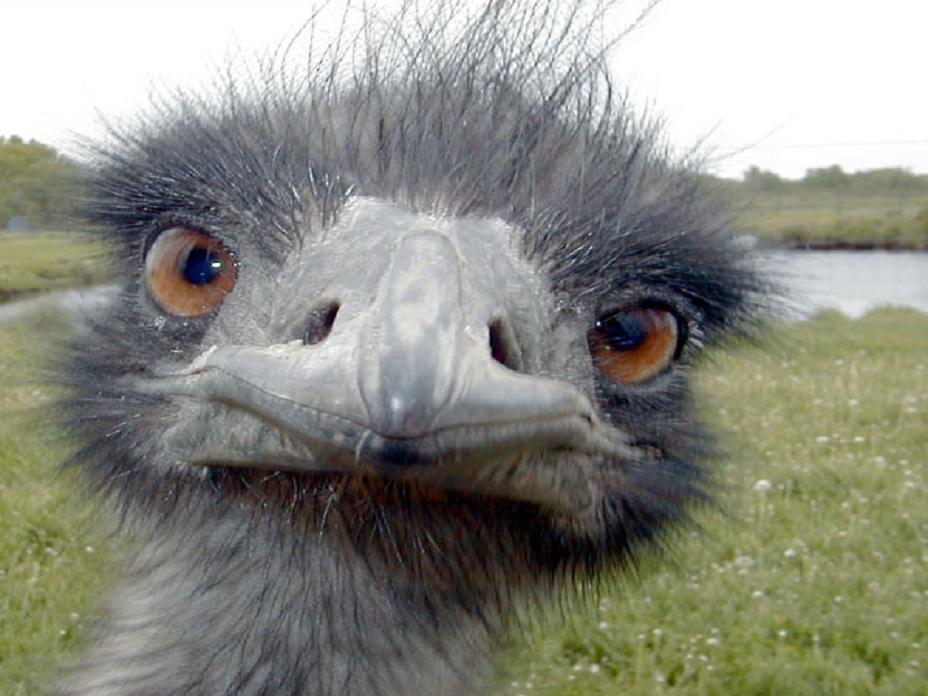Trigger Warning: Contains a graphic description of violence against a Nonhuman Animal and a discussion of domestic violence.
Nonhuman Animal rights groups have been circulating a horrific story of the kidnapping, battering, torture, and murder of a female emu by high school football players at a party:
On Valentine’s Day, February 14, 2015, eighteen-year old student Cassius Mankin entered the property of Bob and Carol Falk in Comanche County, Texas with several other people, both minors and adults. They took the couple’s emu to a party where they allegedly punched out her eyes and choked her to death. Police charged Mankin, a high school football player, with felony animal abuse.
How did this happen? A few bad apples? No, this incident is much more insidious . . . it is systemic. What happened to Miss Molly the emu reflects the power of masculinity and the normalization of violence against feminized bodies.
Violence against the vulnerable in highly-masculinized spaces such as football team parties and frat houses is a phenomenon that is increasingly gaining media attention. Importantly, as the crimes continue to pile up and are kept visible and relevant thanks to the efforts of feminist activists, the facade of gender neutrality in reporting is beginning to lift. That is, the narrative of crime and violence is more likely to acknowledge that there are gendered patterns in this behavior. This isn’t just a perpetrator that happens to be male and a victim that happens to be female. We are starting to recognize that we live in a system where men are socialized to be aggressive and violent, a system where men must prove their masculinity by enacting dominance and control over the vulnerable.
In reading the report of Miss Molly’s terrible death, if we did not know she was a bird, we might easily imagine the victim was a human female. This universality is key–masculine violence knows no species barrier. Patriarchy is a system that privileges men and exploits and terrorizes all feminized bodies.
These connections are essential to recognize for anyone hoping to dismantle oppression. For Nonhuman Animal rights activists, it is important to recognize the violence faced by women as it supports the violence experienced by other animals. For domestic violence activists and social workers, it is important to recognize how men hurt animals like men hurt women. Fortunately, it is common for social workers to be trained to identify these connections when interviewing clients or performing house visits. Social services departments are aware that when Nonhuman Animals are being abused, it is likely that humans in the home are as well.
Great. Now . . . what about the Nonhuman Animal rights movement? It’s time to acknowledge that women matter because masculinity matters. A single-issue movement that frames vegan feminism as “selfish” or “speciesist” wholly misses the point.
 Dr. Wrenn is Lecturer of Sociology and past Director of Gender Studies (2016-2018) with Monmouth University. She received her Ph.D. in Sociology with Colorado State University in 2016. She received her M.S. in Sociology in 2008 and her B.A. in Political Science in 2005, both from Virginia Tech. She was awarded Exemplary Diversity Scholar, 2016 by the University of Michigan’s National Center for Institutional Diversity. She served as council member with the American Sociological Association’s Animals & Society section (2013-2016) and was elected Chair in 2018. She serves as Book Review Editor to Society & Animals and has contributed to the Human-Animal Studies Images and Cinema blogs for the Animals and Society Institute. She has been published in several peer-reviewed academic journals including the Journal of Gender Studies, Feminist Media Studies, Disability & Society, Food, Culture & Society, and Society & Animals. In July 2013, she founded the Vegan Feminist Network, an academic-activist project engaging intersectional social justice praxis. She is the author of A Rational Approach to Animal Rights: Extensions in Abolitionist Theory (Palgrave MacMillan 2016).
Dr. Wrenn is Lecturer of Sociology and past Director of Gender Studies (2016-2018) with Monmouth University. She received her Ph.D. in Sociology with Colorado State University in 2016. She received her M.S. in Sociology in 2008 and her B.A. in Political Science in 2005, both from Virginia Tech. She was awarded Exemplary Diversity Scholar, 2016 by the University of Michigan’s National Center for Institutional Diversity. She served as council member with the American Sociological Association’s Animals & Society section (2013-2016) and was elected Chair in 2018. She serves as Book Review Editor to Society & Animals and has contributed to the Human-Animal Studies Images and Cinema blogs for the Animals and Society Institute. She has been published in several peer-reviewed academic journals including the Journal of Gender Studies, Feminist Media Studies, Disability & Society, Food, Culture & Society, and Society & Animals. In July 2013, she founded the Vegan Feminist Network, an academic-activist project engaging intersectional social justice praxis. She is the author of A Rational Approach to Animal Rights: Extensions in Abolitionist Theory (Palgrave MacMillan 2016).
Receive research updates straight to your inbox by subscribing to my newsletter.

